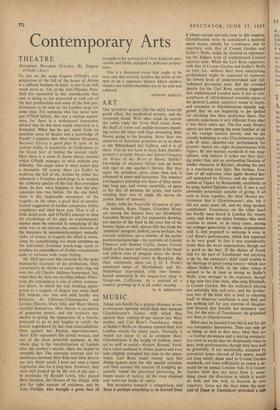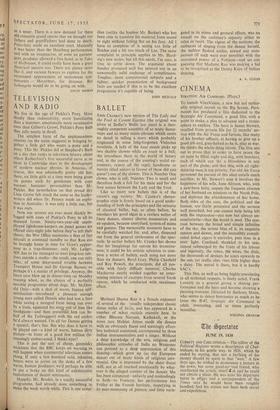MUSIC
THERE can hardly be a greater distance in our professional operatic world than that between Glyndebourne's Figaro. with which they opened their coming-of-age season last Wed- nesday, and Carl Rosa's Tannhintser, which at Sadler's Wells on Monday opened their first London season for many years. Normally it would not occur to us to compare them. Glyndebourne is the height of fashion, musi- cal as well as social—Mozart, Rossini, Verdi, for a select audience in dinner jackets and even tails (slightly crumpled this time in the chara- banc). Carl Rosa could muster very few dinner jackets even for this special occasion, and their normal life consists of trudging de- jectedly round the provinces presenting, be- tween weeks of variety, all the most despised and worn-out hacks of opera.
it about current operatic taste in this country. Glyndebourne must be considered a national opera house, chiefly for Londoners, and its repertory, with that of Covent Garden and Sadler's Wells, might he claimed as represent- ing the highest level of sophisticated London operatic taste. While the Carl Rosa repertory, with that of Covent Garden and Sadler's Wells on tour (i.e., without their most enterprising productions) might be supposed to represent the lowest level of undernourished and old- fashioned provincial taste. But the crowded theatre for the Carl Rosa opening suggested that sophisticated London taste is not so con- temptuous of old-fashioned romantic opera as the general London repertory seems to imply, and murmurs at Glyndebourne equally sug- gested that we are beginning to get spoiled for anything less than perfection there. Our operatic experience is very different from what it was thirty years ago. The five main Mozart operas are now among the most familiar of all to the average musical person, and we are
already beginning to take Glyndebourne stand- ards of pure,. chamber-size performance for granted—hence our slight disappointment with Figaro. By any normal standards it was mag- nificent, with incisive if rather too fiery play- ing under Gui, and an outstanding Susanna of similar character in Rizzieri, showing the part in a convincing new light. But Jurinac, love- liest of all sopranos, once again showed her- self uninspired by Mozart, and the character isation of Figaro by Bruscantini, excellently as he sang, lacked lightness and wit. It was a cast obviously potentially capable of giving, if all were in form together, the ideal Mozart per formance that is Glyndebourne's aim, but it did not quite come off, and we, long spoiled, complained. Tannitiiuser on the other hand has hardly been heard in London for twenty, years, and drew out many listeners who were anxious to renew, or in many cases, among the younger generation, to make, acquaintance with it, and prepared to welcome it even in Carl Rosa's performance, which few expected to be very good. In fact it was considerably better than the worst expectations, though not so good as the best. If the choice of Frank Sale for the part of Tannhguser was anything to go by, the company's chief vocal trouble is the shortage of good young tenors—which also afflicts Sadler's Wells. In the other voices it seemed to be at least as strong as Sadler's Wells, even stronger in the sopranos, though it has now lost Una Hale, who sang Elizabeth, to Covent Garden. But the orchestral playing was painfully thin and poor, and the produc- tion was of the kind that is used to adapting itself to whatever conditions it may find, and has nothing left for any exercise of imagina- tion beyond that humble but necessary one. Yet, for the sake of Tannhauser, we grumbled less than at Glyndebourne. or a sneer. There is a new demand for these old romantic grand operas that we thought our fathers and grandfathers had done to death. Freischiitz made an excellent start. Musically it was better than the Hamburg performance. and with an imaginative, or even an extrava- gant. producer allowed a free hand, as in Tales of Itolimann, it could easily have been a great theatrical success too. There are plenty more like it, and various byways to explore for the occasional appeasement of malcontent con- noisseurs -- Meyerbeer, for instance. But Lohengrin would do to be going on with.
COLIN MASON



































 Previous page
Previous page